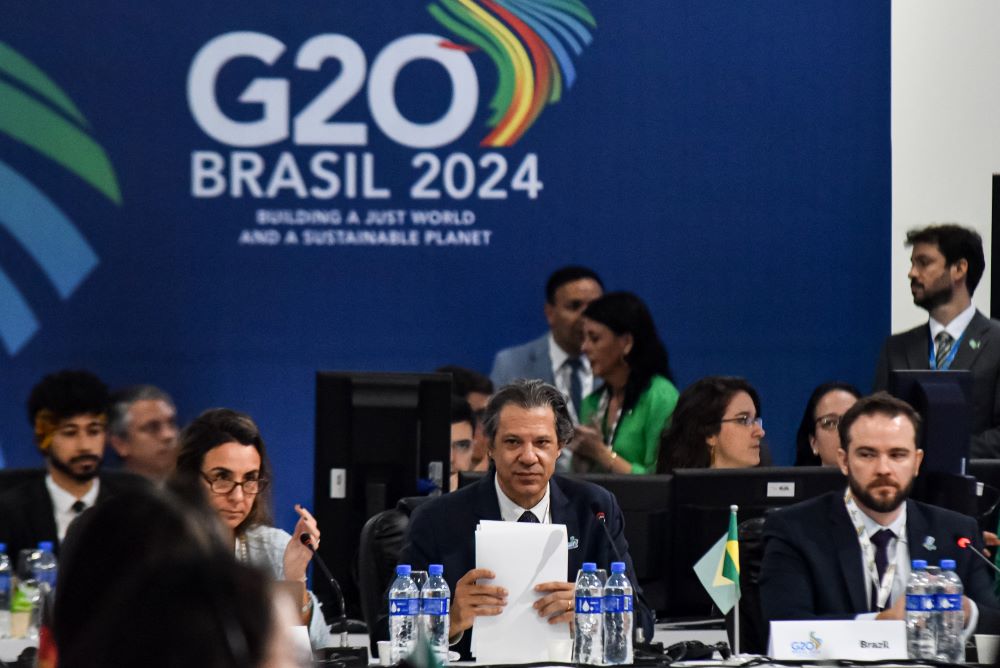Comment: Brazil and France have proposed a tax on the super-rich to fight against poverty and climate change – G20 finance ministers should get behind it this week
Ilan Zugman is Latin America Director at 350.org, based in Brazil, and Fanny Petitbon is France Team Lead at 350.org.
When G20 finance ministers gather in Rio de Janeiro this week, Brazil and France have a chance to put these powerful countries on track to deliver a global wealth tax that could raise over $680 billion per year in the fight to tackle poverty and the climate crisis. Both countries have been vocal supporters of taxing the super-rich to fund international development and climate action.
In April, finance ministers Fernando Haddad (Brazil) and Bruno Le Maire (France) announced their intent to tax the wealth of billionaires by at least two percent annually, prompting ministers from Germany, South Africa and Spain to back the proposal. As the current host of the G20, Brazil commissioned an investigation into the feasibility of this global wealth tax – and the results were published by French economist Gabriel Zucman in June, generating further momentum in efforts to fill the funding gap for climate and development.
Zucman’s findings show that a global wealth tax on the super-rich – billionaires and people with assets worth more than $100 million – could be enforced successfully even if all countries did not adopt it. It is also a popular measure: more than two-thirds of people across seventeen G20 countries show support for making the super-rich pay higher taxes as a means of funding major improvements to our economy and lifestyles.
This isn’t surprising. Ensuring that billionaires are properly taxed could deliver significant, tangible benefits in people’s lives and go some way to addressing the systemic injustices and inequality reflected by the climate crisis and poverty.
The world needs a new global deal on climate and development finance
An ambitious global wealth tax, together with higher and permanent tax on oil corporations and extraction, would provide hundreds of billions of dollars/euros each year to properly fund scaling up renewable energy, rolling out heat pumps and insulation programmes to lower the cost of heating or cooling our homes, new public transport links, future-proof jobs and much more – helping communities to thrive.
It would also end more than a decade of broken promises by G20 states, ensuring that some of the world’s wealthiest countries have enough money in their national coffers to provide adequate finance to pay for those suffering the consequences of climate impacts now. Helping the poorest communities prepare for unnatural disasters like increased wildfires, flooding and sea level rise, and ensuring people can rebuild their homes, infrastructure and places of work when preventative measures are not an option.
Power to communities
A global wealth tax is a moral imperative. By implementing a fairer system of taxation, the G20 could accelerate a just transition to a low-carbon economy, cutting dangerous carbon emissions and boosting living standards and energy access at great scale, while also tackling deep-rooted injustice. Delivering finance for community-oriented renewable energy projects across Latin America, Africa, Asia and the Pacific would put power back in the hands of communities that continue to suffer from the violent legacy of colonialism and extractive profiteering.
For this to be achieved France, and other wealthy nations in the G20 like Germany and the UK, must be willing to make concessions and assume historical responsibility for exploiting fossil fuel extraction in the economically poorer countries whose citizens are experiencing the worst consequences of the climate crisis. The emerging French government must deliver concrete plans to redirect its fortune and tax its billionaires towards a renewable energy-powered planet.
Where East African oil pipeline meets sea, displaced farmers bemoan “bad deal” on compensation
It is incumbent on both Brazil and France to seize the opportunity presented by growing support to deliver a global wealth tax at the meeting of powerful finance ministers this week. Both countries must do everything they can to build trust and political will around the crucial proposal. But this will be a challenge if they undermine their stance on the international stage with contrasting domestic policy, something both governments are guilty of.
Brazil has been pushing for new oil projects, including in the Amazon and is gearing up to become the fourth-largest oil producer in the world. France, despite being fined by the European Commission, is still not on track to meet its domestic renewable energy targets and announced in February a two billion-euro cut to the budget allocated for environmental and energy transition programmes. It is high time for both countries to stop the smoke and mirrors approach to international diplomacy, by aligning their commitments at national and international levels.
Leaders’ summit
This week, ministers Haddad and Le Maire have a responsibility to rally their G20 counterparts around the wealth tax proposal and send a strong and unified signal to heads of state and governments to take concrete action that delivers a global wealth tax on billionaires when they meet in November.
The stakes are high. The vast scale of global inequality means that nearly one in eleven people around the world live below the poverty line according the World Bank. In addition, this is set to be yet another record-breaking year for climate impacts, in a critical decade to prevent global heating from tipping over the 1.5°C threshold – a limit beyond which the ability of impacted communities to survive and thrive will be put at intolerable risk. We need to see vast quantities of finance mobilised to scale up renewable energy at the speed needed, and billionaires and multi-millionaires need to be forced to pay up.
We’re all rooting for this one to work – it can take us a long way.
Read More

